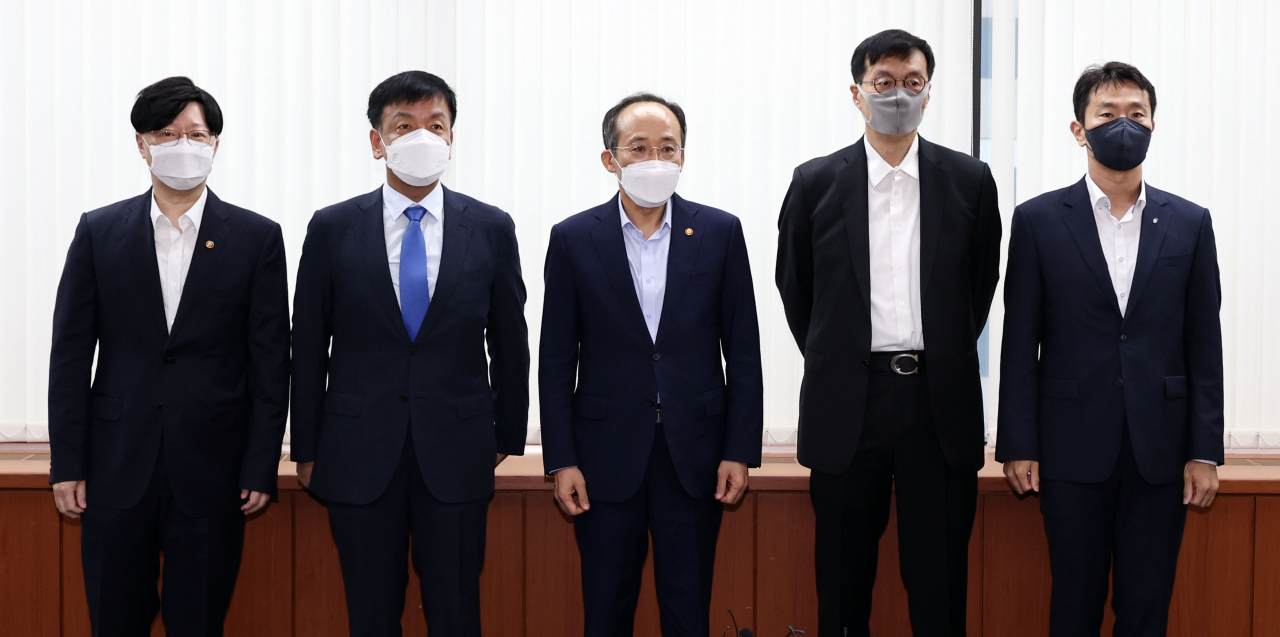Market Now
Fiscal chief vows help with falling exports
 |
This photo taken on Monday, shows Finance Minister Choo Kyung-ho (C) posing for a photo with the top central banker and the financial regulators ahead of their meeting on economic situations. The participants are Bank of Korea Gov. Rhee Chang-yong (2nd from R); Kim So-young, vice chair of the Financial Services Commission (L); Choi Sang-mok, senior presidential secretary for economic affairs (2nd from L); and Lee Bok-hyun, chief of the Financial Supervisory Service. (Yonhap) |
Finance Minister Choo Kyung-ho said Sunday that he would help Korean companies sell more goods overseas by offering more loans at a time when Korea’s exports snapped 15 months of double-digit growth in June, stocking recession worries.
The trade deficit in January-June this year reached $10.3 billion, the highest level ever recorded in the first six months of a year, despite record-high exports in the same period, as soaring energy prices offset the export gains.
“I am not quite sure how exports will look like in the remaining six months,” Choo, who doubles as deputy prime minister, said at an emergency meeting of Cabinet members handling the economy. “We will bring in at least an extra 40 trillion won ($30.8 billion) to our fund to help companies with exports.”
The fund, which the government earmarks to provide loans so companies could make bold decisions in exports and imports knowing there is a safety net, will be increased to 301 trillion won and be used to bring down export costs, according to Choo.
“The latter half of this year will be challenging. Supply shocks caused by the Ukraine crisis are still there and exports costs –- getting goods over where they’re supposed to go –- are running higher than expected,” Choo said, warning against a “full-blown crisis,” prompted by inflation and a global downturn.
The Korea International Trade Association said it expects Korea to report a trade deficit of $3.3 billion in July-December this year, which would mark the second-highest deficit the country will see since 1996 just before the International Monetary Fund bailed out Asia’s fourth-largest economy from a financial crisis.
Choo noted that his ministry would work to change the way exports take place, saying the government would back companies tap into European as well as Southeast Asian markets, where Korea has a relatively smaller footprint than US and Chinese markets.
“The government would expand support for companies venturing into bourgeoning markets for new digital businesses, too,” Choo said.
Analysts have said the government should restructure businesses so those living on government subsidies would no longer sap money that could be put to better use.
“In the long run, we need to restructure businesses -- those facing bankruptcy or which will be close to it if the government cuts fiscal support,” said Kim Young-ick, an economics professor at Sogang University’s Graduate School of Economics.
Liquidating such “zombie” firms, should be a top priority for Korea to ride out the impending economic slowdown, Kim added.
By Choi Si-young (siyoungchoi@heraldcorp.com)







![[Contribution] Preparing for future with strategic public procurement](http://res.heraldm.com/phpwas/restmb_idxmake.php?idx=151&simg=/content/image/2024/11/29/20241129050037_0.jpg)
